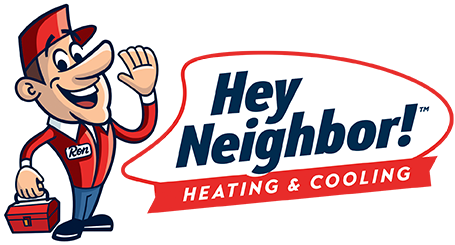High-efficiency cooling wastes less energy, which translates directly into monthly utility bill savings for you. There are many ways to improve your air conditioner’s efficiency, from small changes in how you cool your home to purchasing a new, high-efficiency unit when it’s time to replace your old, inefficient one. Hey Neighbor Heating & Cooling has the answers you need to start living a more comfortable and high-efficiency lifestyle.
SEER rating
SEER is an acronym for Seasonal Energy Efficiency Ratio. It’s an air conditioner’s efficiency rating, measuring how well a unit converts input energy into cooling performance. At present, the current minimum SEER rating at which an AC unit can be manufactured is 13. Of course, units are produced with SEER ratings much higher than 13 and offer increased efficiency for every increment in rating. Units manufactured before 2006 may have lower SEER values, as current efficiency regulations weren’t in effect before that time. If your AC unit is over 15 years old, you could be paying over 30% more than you’ll pay to operate a newer model. When considering a new AC system for your home, it’s wise to select a unit with the highest SEER rating you can comfortably afford. Spending a little more up-front will help you enjoy energy savings throughout your system’s lifetime.
The temperature target
The temperature target set on your thermostat has a significant effect on your air conditioning’s efficiency. Trying to maintain a wide temperature differential between your home and the outdoor environment is hard on your air conditioner. Your AC system must consume more energy for every degree of difference created between the inside and outside temperatures. Keeping your home at 75-78° usually achieves a good balance between efficiency and comfort. Avoid setting your thermostat lower than 75 for long periods, and never set the temperature very low to try and cool your home more quickly. Setting the temperature target too low will overwork your air conditioner, causing it to lose efficiency and increasing the cost to cool your home. Setting the temperature lower while you’re home and raising it a few degrees when you’re away allows your air conditioner to work less for an efficiency boost without causing it to work too hard when you return home.
Airflow and ductwork
The ductwork in your home distributes the air cooled by your AC unit throughout your home. So, if your ducts are dirty, clogged, or leaking, your conditioned air can’t be distributed effectively, and efficiency is lost. Just like the other factors we mentioned above, airflow limitations will cost you money. Nobody wants that.
We recommend scheduling regular air conditioning maintenance because it helps keep your AC system running as efficiently as it can. Along with that, you should have your ductwork inspected regularly. Patching holes and cleaning out dust and debris will ensure your ductwork performs its job properly, enabling you to get the most from your system and raising its overall cooling efficiency for improved temperature control and air circulation.
Are you looking for more ways to conserve energy and enjoy better performance from your heating and cooling system? We invite you to contact us online to schedule an in-home visit for air conditioning evaluation, maintenance, or repair. You can also learn much more about improving your home’s HVAC performance and energy efficiency on our online blog – along with many other relevant topics and tips!


Comments are closed